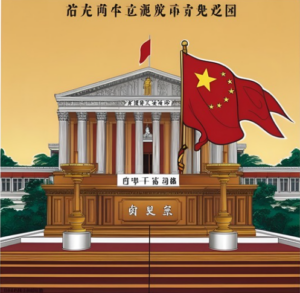Views
Finder on the Supreme People’s Court’s Notice on Foreign State Immunity Procedures

The news about the Supreme People’s Court of the People’s Republic of China issuing the Notice on Procedural Matters Related to Civil Cases Involving Foreign State Immunity has been previously reported on this blog.
Following this significant development, Professor Susan Finder, a distinguished Scholar in Residence at Peking University School of Transnational Law, has kindly shared her insights on the matter. Her post was originally published on the Supreme People’s Court Monitor. Given its valuable contribution, we decided to repost it here.
Our sincerest thanks to Professor Susan Finder for her thoughtful analysis and generosity in sharing her thoughts. Read more
The Supreme People’s Court of the People’s Republic of China issued the Notice on Procedural Matters Related to Civil Cases Involving Foreign State Immunity
(This is written by Xiaoxuan Gu, a PhD student in School of Law, University of Macau)
The Foreign State Immunity Law of the People’s Republic of China (CFSIL) took effect on January 1, 2024.[i] To ensure its proper implementation and guide courts nationwide in lawfully and efficiently adjudicating civil cases involving foreign state immunity, the Supreme People’s Court (SPC) formulated supporting procedural rules. On March 26, 2025, the SPC issued the Notice on Procedural Matters Related to Civil Cases Involving Foreign State Immunity (hereinafter the “Notice”), which provides definitive guidance to courts at all levels in handling such novel foreign-related cases.
The Notice stipulates provisions on key procedural matters, including case acceptance criteria, centralized jurisdiction mechanisms, service of process rules, jurisdictional immunity review procedures, and protocols for obtaining evidentiary certifications from the Ministry of Foreign Affairs. Read more
Caught Between Legal Boundaries: Child Custody Disputes Across Japan and Bangladesh
I would like to express my sincere gratitude to MD Sanwar HOSSAIN, LLB (Hons) Wolverhampton University, MSS (Dhaka University), PgDiP (Northumbria University), Barrister at law (Hon’ble Society of Lincoln’s Inn), Advocate (Appellate Division) Supreme Court of Bangladesh and Managing Partner, S Hossain & Associates law office, for bringing the Bangladesh courts’ decisions to my attention.

I. Introduction
The breakdown of an international marriage often leads to complex cross-border disputes, especially when children are involved. Tensions can intensify if one parent decides to take the children to their home country, often without the consent of the other parent.
In such cases, when the countries involved are signatories to the HCCH 1980 Child Abduction Convention, the Convention’s mechanisms are designed to facilitate the prompt return of children to their country of habitual residence. This framework aims to prevent unilateral relocations that could have lasting impacts on the child’s stability. However, when one or both countries are not parties to the Convention, resolving such cases becomes significantly more challenging. In such cases, national courts are compelled to address competing custody claims, assess allegations of wrongful removal, and determine whether they have jurisdiction to hear the case, all while balancing, often quite differently, the best interests of the children involved.
The case presented here is just one of many unreported cases where a romance relationship turns sour, leading to lengthy and contentious legal battles across jurisdictions. This note will focus on the Bangladeshi court’s treatment of the case, as it offers useful insights into the court’s approach to handling such complex cross-border disputes.
News
New Editor
We are delighted to announce another addition to our Editorial Board: Elsabe Schoeman.
Elsabe has long been one of the leading scholars of private international law in South Africa, having authored countless publications in the areas of jurisdiction in cross-border commercial litigation and choice of law in contract, delict/tort and selected areas of family law, with a recent focus on access to justice for victims of human rights infringements and environmental torts. She has also advised a variety of law commissions and private law firms on these topics.
Elsabe has just left the office of Dean of the Faculty of Law at the University of Pretoria and will be focusing her work for the blog on legal developments in South Africa.
Case note on Oilchart International v. Bunker Nederland BV
Vesna Lazic (Asser Institute, Utrecht University) has published an interesting case note on the complex case of CJEU Judgment C-394/22 Oilchart International NV v O.W. Bunker Nederland BV, ING Bank NV in Revue de Droit Commercial Belge. This case dealt with the interaction between the Brussels I-bis Regulation and the Insolvency Regulation. You can read it here: 2025 Note rdc_tbh2025_2p308 .
In this case, the Court held that:
Article 1(2)(b) of Regulation (EU) No 1215/2012 of the European Parliament and of the Council of 12 December 2012 on jurisdiction and the recognition and enforcement of judgments in civil and commercial matters, must be interpreted as not applying to an action brought in a Member State against a company seeking payment for goods delivered which does not mention either the insolvency proceedings opened previously against that company in another Member State or the fact that the claim was already declared in the insolvency estate.
Asser Institute Conference: Adapting Private International Law in an Era of Uncertainty
Announcement prepared by Eduardo Silva de Freitas (Asser Institute and Erasmus University Rotterdam)
The T.M.C. Asser Institute is organising the conference “Adapting Private International Law in an Era of Uncertainty” as part of its 60 Years Series. The event will take place in The Hague (The Netherlands) on Friday, 24 October 2025, and will gather academics, practitioners, and early career researchers who will address current topics in Private International Law, including developments in the digital age and the protection of weaker parties.
The programme is available by clicking here: asser-institute-60-years-series_final.pdf
To register for the conference, please visit: T.M.C. Asser Instituut Registration Form
For more information you can contact the organisers at: E.Silva.de.Freitas@asser.nl or V.Lazic@asser.nl



